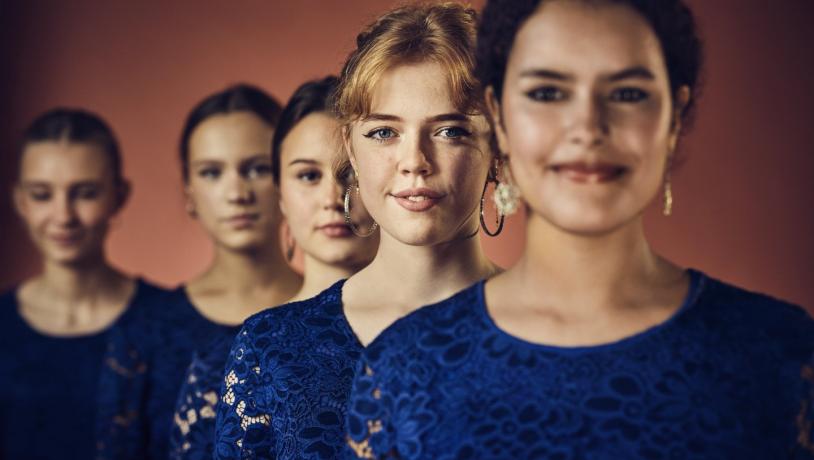
Why Does Denmark Have Such a High Quality of Life?
When international surveys ask citizens around the world how happy they are with their daily lives and personal circumstances, Denmark repeatedly features at the top of happiest nations worldwide.
Since 2013, the Danes have consistently taken one of the top spots in the United Nation’s World Happiness Report, coming in as number 2 on the list in 2024. What’s behind our high quality of life, and what’s the secret to creating happy people? Read on to find out…
Freedom, Social Support and Good Health
According to the World Happiness Report, happiness is closely linked to factors like levels of caring, freedom to make life decisions, social support, generosity, good governance, honesty, health and income, social equality and community spirit. These are all concepts that those living in Denmark know rather well. The country offers free university tuition, a high quality of education, no-fee public healthcare, and has a focus on community activities and honesty. It’s a highly trust-based society and there’s always time for hygge…now, that always helps.
The World Happiness Report isn’t just about being happy – smiling, laughing and having an easy life – it’s a way of looking at how to create societies with a high quality of life. You won’t hear streets ringing with laughter in Denmark in the main – Danes have a reputation for being rather quiet in public – we experience happiness as more of a contented feeling, a life without so much worry or stress, and the knowledge that there is a social safety net if things go wrong.
It’s not to say that everything is perfect in Denmark: as with every nation, we struggle with mental health issues, stress, loneliness and many other problems. We’re often debating how to improve these situations and find necessary solutions just like other countries. These are some of the lenses we look through when we do that, and some of the cultural constructs that help.
Work-Life Balance
Part of the Danish formula stems from a healthy work-life balance. In Denmark, working conditions are generally good, and an ordinary work week is 37 hours, and a minimum of five weeks holiday annually is the norm. Along with a stable economy, this has created a content workforce across the board. It also means that life and work can be treated separately: work rarely takes over your life. Leisure time is a huge part of the Danish culture too, which is optimised in several ways. This can be social gatherings, sports (football, sailing, handball, badminton, swimming and cycling top the list) or taking a course, joining the local book or theatre club or volunteer work. Leaving work on time, cycling home or jumping on the accessible and effective public transport network, picking up your children from day-care and having a cosy dinner with family or friends, equals happiness for most Danes.
Trust and Community
Trust is another significant factor in the Danes’ high quality of life. The default is to trust one another in business, government, and personal relationships. Honesty is expected, and corruption is low. Children as young as eight or nine can be seen using public transport on their own, and it’s usually safe to walk or bicycle in Denmark at any time of the day or night as well. Denmark comes second to Sweden in the list of the world’s most trustworthy countries.
The high levels of social trust also help persuade the Danes to pay some of the world's highest taxes to finance an extensive set of welfare programs designed to combine economic growth, social mobility and environmental sustainability. The Danish health system, for instance, is tax-funded and free for the patient, as are the Danish schools and universities for all students. Childcare is subsidized, and the elderly receive state pension and care help. The idea is that values of trust and community spirit and a feeling of empowerment makes everyone contribute to the community – and in return, the community will help care for all.
Learning Through Play
Understanding the impact of learning through play and having fun is also at the heart of the Danes' DNA. And so, to nobody’s surprise, the second-biggest toy producer in the world, LEGO, just happens to originate from Denmark too. ‘Learning through play’ is deeply rooted in Danish society and is believed to foster the ability to create visionary ideas and products, to collaborate, and to think out of the box – all of which the Danes consider essential 21st-century skills. Play isn’t something relegated to the kindergarten either: it’s a key design method and used by the country’s leading start-ups too.

Photo:© LEGO® House Photographer: Frame & Work
Making Time For Music
Just as playing make us happy, so does singing. It improves sleep and releases stress and makes us relax. It offers emotional release too and sharpens concentration, memory and attention. When singing together, we are all drawn into an inclusive community with a common pulse and where everyone is equal. Danes sing on many occasions throughout life: baptisms, weddings, funerals, birthdays, Midsummer, Christmas, parties, school assemblies, sporting events, etc.
At the pavilion, the DR Danish National Girls’ Choir will give a taste of their singing skills too. The young elite choir, consisting of 50 talented Danish girls aged 16-22 and their exceptional young conductor, Charlotte Rowan, is one of the world’s best girls’ choirs. It is one of Denmark’s strongest musical brands and will delight with centuries of Danish song tradition at the Denmark Pavilion. A digital piece, Let your voice be heard, will be on show at the Pavilion every day, celebrating the human voice and its ability to express, empower and unite people across the spectrum.
On top of this, VisitDenmark, Le Bicolore / Maison du Danemark and ROSA (Danish Rock Council) will present five of the most exciting Danish music acts in The Denmark Pavilion during the Olympics in Paris this summer, all chosen to represent the diversity and depth of Danish music. They include Danish-Iranian sensation Dayyani, pop-afrobeat singer JJ Paulo, multi-award-winning Danish-Faroese artist Brimheim, magical electropop pioneer Lydmor, and Nordic superstar musician Teitur. Each of the artists will present a twice-daily showcase over three days, in the afternoon and early evening. Visit the Denmark Pavilion to discover the delights of Danish music and its ever-expanding creative scene.
The Little Things
Hard to pronounce, hygge ("hooga") is difficult to explain, too. In brief, hygge is about taking time away from the daily rush to be together with people you care about – or even by yourself – to relax and enjoy life's quieter pleasures. While many nations enjoy these activities, perhaps the Danish feature of the pursuit is that we have a word for it, and we use it multiple times a day. Prioritising and openly celebrating the little things is part of our recipe for a good life in Denmark.
Spending time in nature
Another Danish unpronounceable concept is the idea of ‘friluftsliv’ – that is, life lived in the fresh air. A famous Danish saying goes that there’s no such thing as bad weather, only bad clothes. Danes believe that they should enjoy nature, whether that’s beaches, forests, hills or fields, at all times of year and in all climates. It’s been proven many times over by scientists that access to nature is good for mental health and wellbeing… and that’s something we’ve seen as a key driver of quality of life in Denmark for years. Whether that’s hardy ‘winter swimmers’ taking to the sea year-round, lycra-clad cyclists whipping through forests in their own mini pelotons, or burly ‘sea lions’ sunning themselves on the sand in the summer, there are plenty of chances to explore and enjoy Denmark’s natural delights.
Learn more about Denmark’s wonder-filled quality of life at The Denmark Pavilion.

Photo:DR/Emilia Therese
Facts about Danish quality of life
|
EDITOR'S NOTESThe Denmark Pavilion is open to the public 26 July–11 August; 11am-10pm (except August 1, from 11:00 to 16:00). Admission is free. WHAT'S ON To stay updated re. What’s On at The Denmark Pavilion, go to: denmarkpavilion.com SoMe hashtag: #denmarkpavilion2024 FURTHER INFO / CONTACT INFORMATION Media attending the Olympic Games are more than welcome to visit The Denmark Pavilion and to contact the press team for further details. Please reach out to PR & Press Manager Lasse Emil Kristiansen at laekri@visitdenmark.com or +4531415390. HIGH RES. IMAGES TO GO Download images and videos from The Denmark Pavilion in Paris and from our extensive Denmark media database here: https://www.visitdenmark.com/denmark-pavilion/images ABOUT THE DENMARK PAVILLON During the Paris Olympics, visitors from around the world can enjoy a free visit to a small piece of Denmark at Champs-Élysées. Here, they can encounter Danish ideas that contribute to creating a better life and a better world. VisitDenmark, in collaboration with the Ministry of Industry, Business and Financial Affairs, leads this initiative, which is supported by Realdania, the Consul George Jorck and Wife Emma Jorck Foundation, and The Trade Council. |

Kommunikations- og udviklingsdirektør

PR & Press Manager, Italy & France
PR & Press Manager, UK





